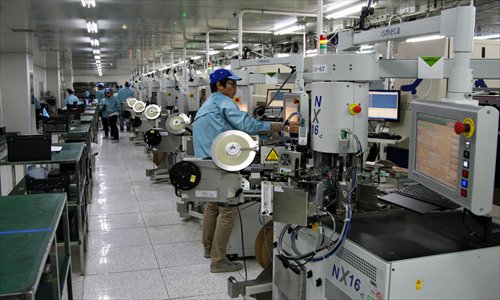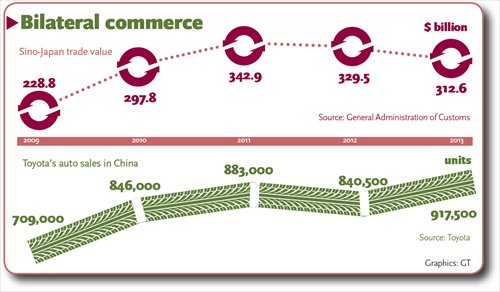HOME >> BUSINESS
Sino-Japan tensions hurt ties: MOFCOM
By Wang Xinyuan Source:Global Times Published: 2014-1-21 23:48:02

Workers in a Sino-Japanese joint venture in Nantong, East China's Jiangsu Province Photo: IC

A spokesperson for China's Ministry of Commerce (MOFCOM) said Tuesday that tense Sino-Japanese relations have hurt bilateral trade.
China's trade with Japan declined in 2013, mainly due to economic reasons but the tensions between the two countries also hurt trade, said Shen Danyang, spokesman for MOFCOM.
"A series of wrongdoings by the Japanese government starting with the 'purchase' of China's Diaoyu Islands in 2012 have damaged the development of Sino-Japanese trade and economic relations," Shen said.
Japan's Prime Minister Shinzo Abe also caused anger in China by visiting on December 26 Tokyo's notorious Yasukuni Shrine, which enshrines Japan's war dead including 14 Class-A war criminals of World War II.
The trade value between China and Japan hit $312.6 billion in 2013, down 5.1 percent from a year earlier, according to MOFCOM.
China's exports to Japan fell by 0.9 percent year-on-year, while imports from Japan fell 8.7 percent from a year earlier, Shen said.
Japan should create favorable conditions for the resumption of Sino-Japanese economic trade relations, he noted.
China is Japan's largest trading partner, while Japan is China's fifth largest. Bilateral trade has been sliding since 2012 when the Diaoyu Islands spat began, according to official data.
Japanese companies in China were dealt a heavy blow in September 2012 when the Japanese government claimed to "nationalize" China's Diaoyu Islands. Many Chinese citizens took to the street to protest, even smashing and burning Japanese cars.
Sales of Japanese cars plunged by as much as 40 percent in September and October 2012.
Consumers would have second thoughts about buying a Japanese model for fear that their cars could be damaged amid more anger in the future, Jia Xinguang, managing director with China Automobile Dealers Association, told the Global Times on Tuesday.
"All Japanese companies in China hope for a stable business environment," Xu Yiming, a spokesman for Toyota China, told the Global Times on Tuesday.
Toyota China sold 917,500 units of passenger cars in 2013, up 9.2 percent year-on-year. The Japanese carmaker has set a sales target of 1.1 million units of cars for this year, showing that it is still optimistic about China's growing market, according to Xu.
The sales growth of Japanese carmakers in 2013 was partly due to promotional efforts and the launch of new models, as well as China's improved economy, Shi Jianhua, deputy secretary-general of the China Association of Automobile Manufacturers, told the Global Times on Tuesday.
But tensions between the two countries create uncertainty about the performance of Japanese automakers, Shi said.
Consumer confidence in Japanese home appliance makers also dropped as Japanese firms have invested less in China, Lu Renbo, director of the Consumer Electronic Product Survey Office at the China Electronic Chamber of Commerce, told the Global Times on Tuesday. The market share of Japanese TV makers like Toshiba, Sanyo and Panasonic is limited, Lu noted.
China's falling imports from Japan in 2013 showed that Chinese consumers are reluctant to buy Japanese goods, Xu Changwen, an economist at the Chinese Academy of International Trade and Economic Cooperation, told the Global Times on Tuesday.
Meanwhile, China's imports from South Korea grew by 8.5 percent year-on-year in 2013, surpassing imports from Japan for the first time and benefiting from a stable political relationship between the two countries, he said.
Japan's economic growth is expected to slow down this year as consumption tax will be raised from April, which will constrain domestic purchasing power, analysts said. Dim trade prospects will also weigh on Japan's economy, Xu noted.
As about 60 percent of Sino-Japanese trade value comes from Japanese companies in China, the lessening investment by Japanese companies is a negative factor for China's economy too, he said.
Japan's direct investment in China reached $7.06 billion in 2013, down 4.28 percent, while China's investment in Japan fell by 23.5 percent from a year earlier, MOFCOM data showed.
Posted in: Economy